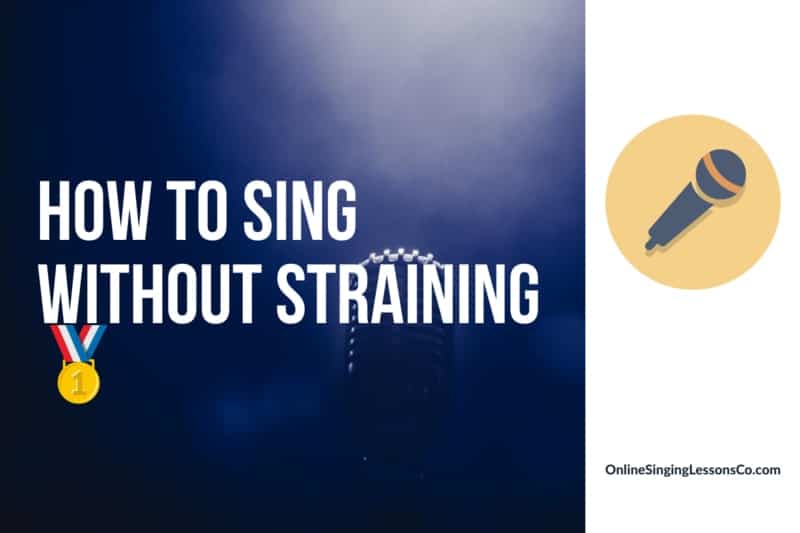How to Sing without Straining – PRO Tips🥇(Feb 2026)

In this article, we’re going to be talking about how you can sing correctly, without needing to strain and struggle to hit notes within your low, medium, and high register.
Singing with strain is one of the reasons why singers end up injuring their throat, have to take time out from performing (touring) or practicing and in the worst cases, have to have surgery to correct a physiological injury.
Therefore, we want to help you identify the reasons why you may be straining your voice, so that you can work on correcting the underlying issue.
How to Sing Without Straining – Key Issues
As outlined in the video above, there are multiple reasons why you may be straining your voice (we’ve written them below).
Be aware that your situation is unique to you, and whilst these are general areas that you can look at, there may be multiple issues at play with certain individuals.
It all depends on a multitude of factors, including your singing routine and other factors that we’ve provided below:
- Overusing your voice – As with most things, overuse can damage your voice, especially if you’re demanding 100% from your voice on every occasion. Regular practice, using vocal warmups and exercises will help to build up vocal stamina so as to minimize vocal downtime. Additionally, look at scheduling your vocal performances wisely, so you have a few days in-between performances to practice more in to build vocal stamina, and schedule vocal performances wisely, so that you have a small break to allow recovery between performances.
- Stress & Fight or Flight response – Stress and anxiety can trigger what’s referred to as the ‘Fight or Flight’ response, which is an evolutionary concept to describe the fear that all humans feel when we’re dealt with situations where actions are required for the purposes of survival. The issue is, living in the 21st century, we rarely need this response, yet other activities like performing and social speaking can trigger it. Finding ways to deal with this anxiety, including performing more regularly, doing certain exercises, etc.
- Singing above your range – Self-awareness is crucial, especially of your current vocal ability, in this case, your range. By knowing what you’re currently capable of, you can recognize when you’re singing a song or parts of a song that are unattainable and will cause strain, and ultimately provide damage to your voice.
- Underlying health problems – Your voice reflects your current health, and as discussed in the video, chronic stress, fatigue and other illnesses can severely affect your voice. Therefore, trying to resolve these issues is highly beneficial. Although we advise that you consult a doctor, we also recommend taking a look at the Medical Medium, with his tips on certain foods/natural supplements helping to cure specific illnesses.
- Posture problems – Posture has a huge impact on the positioning of your head, throat, and chest. Ultimately if your posture isn’t good, it can cause breathing-related and strain-related issues when trying to sing, and this will be more apparent when trying to sing high notes, or sing songs that require better breath control.
- Inefficient movements – A lot of people will tense up their throat, change their posture, and make other subliminal movements whilst singing. We recommend singing in front of the mirror to help identify some of these.
- Bad habits – As we alluded to before, singing involves a lot of muscle memory, and therefore you may have developed some bad habits through years of singing without proper instruction. Correcting this is vital.
- Without warming-up – An athlete wouldn’t exercise without warming up, and neither should a singer. Vocal warmups are a way to help prepare the voice,
- Inefficient vocal techniques – Making sure that you’re following a developed vocal exercise schedule is important, and so make sure that you’re examining the vocal exercises video that we’ve featured below
- Poor breathing habits – Poor breathing habits mean that you’ll have less air in the lungs, and this means less power for the vocal cords. Practicing good posture and correcting your breathing habits will help your overall singing and will eliminate vocal strain.
Want to Learn Specific Vocal Exercises from World-Class Vocal Teachers?
We recommend checking out 30 Day Singer and their 14-Day Free Trial of their online singing program if you want to learn about specific exercises with HD-quality video lessons.
>>>Get Access to the 30-Day Singer – 14-Day Free Trial<<<
Exercises to Help You Sing Without Straining
It’s important to build-up good vocal habits, which allow you to sing with minimal tension, whilst giving you a strong voice with a versatile vocal range.
To do this, vocal exercises can be done on a regular basis, which will in turn provide both muscle memory and vocal stamina.
Above is a video that demonstrates two exercises that will help to remove vocal tension:
1) Exercise one includes sticking your tongue out of your mouth, whilst working through your vocal warmups, including scales and other specific vocal exercises. How does this help? Well, it helps to eliminate the tongue altogether from the process of singing, as sometimes the tongue can get in the way, so we want to firstly train our muscle-memory to disengage the tongue.
2) Use the ‘Lip Bubble’ exercise (refer to the video at 4:06) – Simply take your hands and place your index and second finger on either side of your mouth, on your cheeks, and push them in slightly towards your mouth. Then blow air out of your mouth, and make your lips trill (sounding similar to a horse). You’re going to then add pitch (frequency) to this trill, and work through scales whilst doing this exercise. You’ll be surprised how effective this exercise is at removing tension and extending your vocal range, if done consistently over a prolonged time.